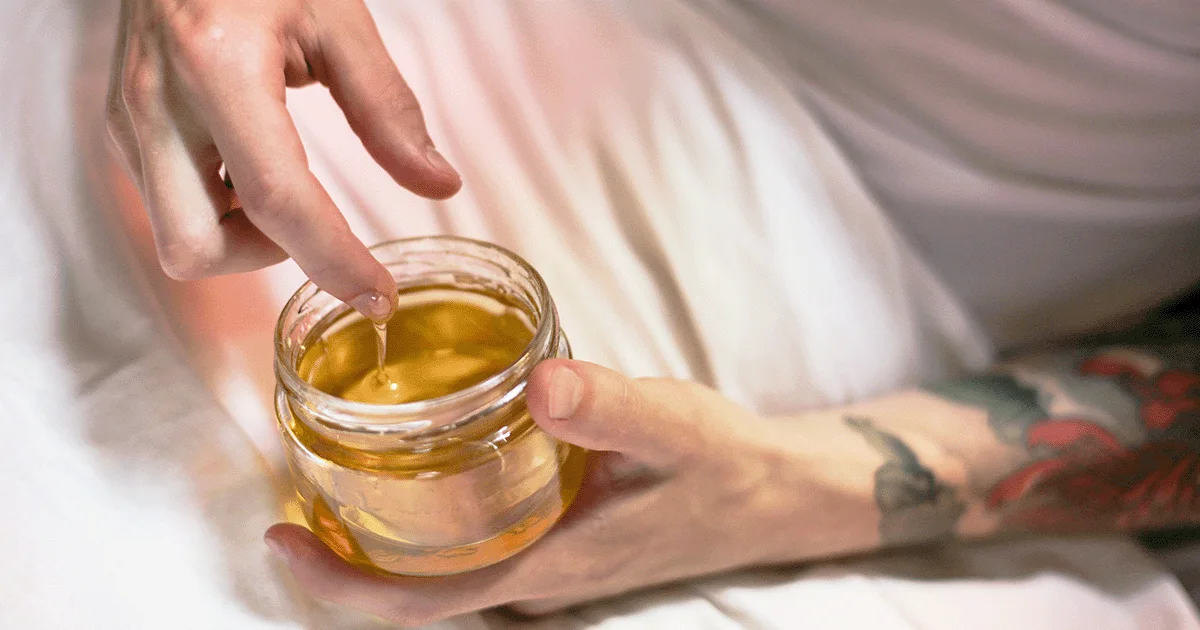Here's what we'll cover
Here's what we'll cover
For many people, premature ejaculation (PE) can be a cause for embarrassment and frustration. While occasional PE might not be a bother, if it persists, it can be a reason to seek treatment. Why does it happen and what can you do about it? Read on to learn more about symptoms, causes, and treatment options for premature ejaculation.
What is premature ejaculation?
Premature ejaculation (PE) is one of the most common male sexual conditions, affecting around one-third of men aged 18–59 (Crowdis, 2021). PE (also called early ejaculation or rapid ejaculation) can keep you and your partner from enjoying sex.
But what is premature ejaculation? Ejaculation is a release of semen from the penis and premature ejaculation is when ejaculation happens before you or your partner would like. Occasional PE is usually nothing to worry about; however, if it is happening regularly or causing you significant distress, you can speak with a healthcare provider to explore the various treatment options available.
According to the International Society for Sexual Medicine (ISSM), you may have PE if you (Althof, 2014):
Always or almost always ejaculate within one minute of penetration
Are unable to control or delay ejaculation during sexual activities all or nearly all of the time
Are experiencing distress, frustration, and/or avoidance of sexual intimacy
Types of premature ejaculation
There are two main types of premature ejaculation: lifelong and acquired.
Lifelong premature ejaculation happens every time (or nearly every time) you have sex—ever since your first sexual encounters. In acquired PE, someone who used to have satisfactory control over when they ejaculate suddenly or gradually develops PE. If you typically have control over when you ejaculate and experience just an instance or two of premature ejaculation, it's usually not considered to be a problem.
Premature ejaculation causes
Though the exact cause of premature ejaculation isn't clear, it is thought to be due to a combination of psychological and physical factors.
Psychological factors that may play a role in PE include:
Anxiety, including worrying about PE
A history of sexual abuse or sexual repression
Depression
Poor body image and/or lack of self-esteem
Decreased sexual drive
Guilt (which may cause you to rush your sexual activities leading to PE)
Unrealistic expectations about sexual performance
Relationship problems
Several physical factors may also be risk factors for PE. While the research behind these factors isn't very clear, they may play a role in the development of the condition. In some cases, treating the underlying condition can improve symptoms of PE.
Other biological factors that may play a role in PE include (Althof, 2014):
Extreme sensitivity in the head of the penis
Inflammation of the prostate gland (prostatitis)
Starting or stopping the use of prescribed or recreational drugs
A condition called chronic pelvic pain syndrome
Thyroid hormone abnormalities
A testosterone imbalance
Aging can cause changes in erections and ejaculation but is not considered to be a direct cause of PE. As you get older, your erections may not be as firm, and you may not last as long before ejaculation (Althof, 2014).
Premature ejaculation and erectile dysfunction
Premature ejaculation is often confused with erectile dysfunction (ED), but they aren't the same thing. With ED, a person might find that they can't get an erection hard enough or for long enough to have satisfying sex. Sometimes people with ED rush through their sexual activities to finish before they lose their erection. Others with ED may develop PE because of the sexual performance anxiety they have due to their ED. PE and ED can exist together, further decreasing sexual satisfaction and affecting your sex life (Sooriyamoorthy, 2021).
Signs/symptoms of premature ejaculation
While the medical definition of PE is the inability to prevent ejaculating within one minute of penetrative sex, this difficulty controlling ejaculation can also happen when you're masturbating or during other forms of sexual activity, including anal sex and oral sex. PE occurs when you ejaculate before you and your partner would like, regardless of the type of sex (Althof, 2014).
Treating premature ejaculation
Successful diagnosis of PE hinges on having an open conversation with your healthcare provider, something that can be difficult in and of itself. While these conversations may be awkward, they are vital to getting the proper treatment and improving your sexual health. Your provider will ask you several questions to determine if you have PE and, if so, which type (lifelong or acquired). Together, you will decide on the best way to treat your premature ejaculation.
Some of the questions may include (Crowdis, 2021):
What is the time between penetration and ejaculation?
Can you delay ejaculation?
Do you feel bothered, annoyed, or frustrated by your premature ejaculation?
How often does PE happen to you?
How long have you had a problem with ejaculatory control?
Does this happen with just one particular person or every sexual partner?
Does PE happen every time you engage in sex?
What type of sexual activity (foreplay, masturbation, intercourse, etc.) do you engage in, and how often?
How has PE affected your sex life?
Is there anything that makes your PE better or worse?
Several types of treatment for premature ejaculation exist, and they are often combined to help you last longer. These include psychological, behavioral, and medical therapies.
Psychological treatments
Psychological therapy for individuals and couples, such as sex therapy, works by improving sexual self-confidence and performance anxiety, as well as allowing you to address personal and/or relationship issues that may be linked to your premature ejaculation.
Relationship problems are a common side effect of PE, so discussing your treatment with your serious partner can help in some cases. While therapy can take time, it is effective. Research has found that it is most beneficial when combined with medical treatment (Porst, 2019).
Behavioral treatments
Behavioral therapy comes in many forms; just as with psychological therapy, it can be combined with medical treatment to enhance its effectiveness. The three most commonly discussed behavioral techniques are the stop-start method, the squeeze technique, and pelvic floor exercises.
The ultimate goal of the first two methods (sometimes called edging) is to make you more aware of mid-range levels of excitement and the sensations leading up to climax so that you can better control and delay ejaculation on your own. Pelvic floor exercises aim to strengthen the muscles that control ejaculation (Raveendran, 2021).
Stop-start: In the stop-start method, you and your partner perform your usual sexual activities until you feel almost ready to ejaculate. You then stop until the urge to ejaculate has passed, after which you resume your sexual activities. You’ll then repeat this process as many times as you need to until you’ve had a satisfying sexual encounter.
Squeeze technique: You and your partner initiate sex as usual until you feel almost ready to ejaculate. At this point, your partner squeezes the end of your penis, where the head meets the shaft until the urge to ejaculate diminishes; repeat as necessary.
Pelvic floor exercises (Kegel exercises): These can help strengthen muscles used during ejaculation. The pelvic floor muscles appear to have increased activity during ejaculation, and it may be that strengthening these muscles can help you delay ejaculation. The pelvic floor muscles are the ones that allow you to stop urinating mid-stream or what you would use to prevent yourself from passing gas.
Decreasing penis sensitivity
Decreasing the sensitivity of your penis can help you last longer and delay ejaculation. There are several ways to achieve this (Porst, 2019).
Masturbation before sex: Some people find that masturbating before intercourse partially desensitizes the penis and allows for better control of ejaculation.
Topical anesthetic creams: The topical anesthetics (numbing medications) most often used are lidocaine, benzocaine, or prilocaine. They can be applied to the head of the penis approximately 10–20 minutes before sex. However, if you use too much or leave it on for too long, you can numb your penis and lose your erection. Be sure to wipe it off before penetration to prevent transfer to your partner.
Topical anesthetic sprays: You can also apply a topical anesthetic spray rather than a cream. One anesthetic spray, lidocaine/prilocaine (brand name Fortacin), has been approved in Europe to treat PE. It uses a unique formulation that prevents the numbing medicine from being absorbed into the skin of the shaft of the penis. Only the penis head (glans penis) is affected, reducing the risk that you lose your erection.
Anesthetic wipes: Anesthetic wipes are a discreet way of applying a topical anesthetic. Apply the wipe to the head of your penis and wait for 5–10 minutes. Wipe the area with a damp tissue immediately before sex.
Medical treatments
When it comes to medical management of premature ejaculation, there are no FDA-approved medications. However, some drugs are used “off-label” in the United States, meaning that it is being used to treat a condition that it was not FDA-approved to treat. One downside of taking medications is the risk of side effects or drug interactions. Make sure to talk to your healthcare provider about your medical history and any medicines you are taking.
Medications used off-label to treat PE include (Porst, 2019; Raveendran, 2021):
Selective serotonin reuptake inhibitors (SSRIs): These drugs were initially FDA-approved for depression treatment, but studies have shown them to be effective for treating PE as well. Paroxetine (brand name Brisdelle), sertraline (brand name Zoloft), fluoxetine (brand name Prozac), and citalopram (brand name Celexa) are SSRIs that may help stop premature ejaculation; they are effective and relatively inexpensive. Dapoxetine is a short-acting SSRI that may also be an effective PE treatment. It can be taken one hour before sexual activity and helps to delay ejaculation.
Tricyclic antidepressants (TCAs): This class includes medications like clomipramine and was also initially approved to treat depression. Studies do show a significant delay in ejaculation with TCAs when used either daily or on-demand (two to six hours before sex).
Phosphodiesterase-5 inhibitors (PDE5-inhibitors): Usually used to treat erectile dysfunction, these medications include sildenafil (brand name Viagra), tadalafil (brand name Cialis), and vardenafil (brand name Levitra). They are most useful for people with both ED and PE; their effectiveness is uncertain with regards to treating PE alone.
Alpha-1 adrenoceptor antagonists: Medications such as terazosin, doxazosin, alfuzosin, tamsulosin, and silodosin, were initially FDA-approved for the treatment of high blood pressure and prostate enlargement. Small studies show that they may help with premature ejaculation if taken one hour before sex, but more research is needed to confirm.
Tramadol: This is a pain medication that also affects serotonin and can delay ejaculation. It also has the potential for addiction and abuse, so it should be used with caution.
Natural remedies for PE
Both zinc and magnesium may play a role in male sexual health.
Zinc may affect testosterone levels, and people with premature ejaculation have been shown to have less magnesium in their semen (Omu, 2001; Nikoobakht, 2005). While the role these vitamins play in PE is not well understood or established, increasing your intake of both minerals may improve your PE.
The best way to increase your zinc and magnesium intake is through diet, although supplementation is an option, with guidance from your healthcare provider. If your provider finds that your levels of these vitamins are low, you can increase your zinc and magnesium by:
Eating foods rich in zinc, including shellfish, lean beef, seeds, fortified cereals, dark chocolate, beans, and nuts
Eating foods rich in magnesium, including leafy vegetables, nuts, beans, and whole-grain cereal
Taking magnesium supplements (recommended daily dose for magnesium supplements is 350 mg/day for healthy adults) (NIH-a, 2021)
Taking zinc supplements (recommended daily dose for zinc is 11 mg per day) (NIH-b, 2021)
Too much magnesium can be dangerous, so be sure to talk to your healthcare provider about your diet and mineral needs.
One study reported that a proprietary blend of zinc, folic acid, biotin, and Rhodiola rosea (golden root) improved premature ejaculation and quality of sex life among people who used it (Cai, 2016).
When to see a healthcare provider
If you are having difficulty controlling your ejaculations during sex and it's making it difficult to enjoy sex, you may have premature ejaculation. Talk to your healthcare provider (and your partner) about your symptoms and treatment options.
DISCLAIMER
If you have any medical questions or concerns, please talk to your healthcare provider. The articles on Health Guide are underpinned by peer-reviewed research and information drawn from medical societies and governmental agencies. However, they are not a substitute for professional medical advice, diagnosis, or treatment.
Viagra Important Safety Information: Read more about serious warnings and safety info.
Cialis Important Safety Information: Read more about serious warnings and safety info.
Althof, S. E., McMahon, C. G., Waldinger, M. D., Serefoglu, E. C., Shindel, A. W., Adaikan, et al. (2014). An update of the international society of sexual medicine's guidelines for the diagnosis and treatment of premature ejaculation (PE). Sexual Medicine , 2(2), 60–90. doi: 10.1002/sm2.28. Retrieved from https://pubmed.ncbi.nlm.nih.gov/25356302/
Cai, T., Verze, P., Massenio, P., Tiscione, D., Malossini, G., Cormio, L., et al. (2016). Rhodiola rosea, folic acid, zinc and biotin (EndEP®) is able to improve ejaculatory control in patients affected by lifelong premature ejaculation: Results from a phase I-II study. Experimental and Therapeutic Medicine , 12(4), 2083–2087. doi: 10.3892/etm.2016.3595. Retrieved from https://pubmed.ncbi.nlm.nih.gov/27698696/
Crowdis, M. & Nazir, S. (2021). Premature ejaculation. [Updated Jul 1, 2021]. In: StatPearls [Internet]. Retrieved on Sept. 30, 2021 from https://www.ncbi.nlm.nih.gov/books/NBK546701/
Martin, C., Nolen, H., Podolnick, J., & Wang, R. (2016). Current and emerging therapies in premature ejaculation: where we are coming from, where we are going. International Journal of Urology , 24(1), 40–50. doi: 10.1111/iju.13202. Retrieved from https://pubmed.ncbi.nlm.nih.gov/27704632/
National Institutes of Health (NIH): Office of Dietary Supplements (2021-a). Retrieved on Sep 10, 2021 from https://ods.od.nih.gov/factsheets/Magnesium-HealthProfessional/
National Institutes of Health (NIH): Office of Dietary Supplements (2021-b). Retrieved on Sep 10, 2021 from https://ods.od.nih.gov/factsheets/Zinc-HealthProfessional/
Nikoobakht, M., Aloosh, M., & Hasani, M. (2005). Seminal plasma magnesium and premature ejaculation: a case-control study. Urology Journal , 2 (2), 102–105. Retrieved from https://pubmed.ncbi.nlm.nih.gov/17629880/
Omu, A. E., Al-Bader, A. A., Dashti, H., & Oriowo, M. A. (2001). Magnesium in human semen: possible role in premature ejaculation. Archives of Andrology , 46(1), 59–66. doi: 10.1080/01485010150211164. Retrieved from https://pubmed.ncbi.nlm.nih.gov/11204619/
Porst, H., & Burri, A. (2019). Novel treatment for premature ejaculation in the light of currently used therapies: a review. Sexual Medicine Reviews , 7 (1), 129–140. doi: 10.1016/j.sxmr.2018.05.001. Retrieved from https://pubmed.ncbi.nlm.nih.gov/30057136/
Raveendran, A. V., & Agarwal, A. (2021). Premature ejaculation - current concepts in the management: A narrative review. International Journal of Reproductive Biomedicine, 19 (1), 5–22. doi:10.18502/ijrm.v19i1.8176. Retrieved from https://www.ncbi.nlm.nih.gov/pmc/articles/PMC7851481/
Sooriyamoorthy, T. & Leslie, S. W. (2021). Erectile dysfunction. [Updated Aug 12, 2021]. In: StatPearls [Internet]. Retrieved on Sept. 30, 2021 from https://www.ncbi.nlm.nih.gov/books/NBK562253/










